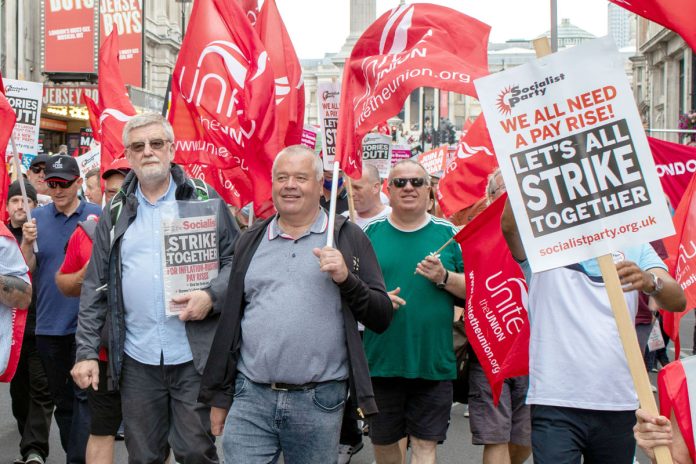Rob Williams, Socialist Party national workplace and trade union organiser
Perhaps as never, or at least rarely, before – this year’s conference of the Trades Union Congress (TUC) took place in the middle of stormy events. In particular, the meltdown in the Tory party and the rising strike wave provided the backdrop to what is normally one of the most sedate union conferences.
Just minutes after the end of the congress, as delegates were walking to the train station, news of Truss’ resignation flashed up on their phones. On the other hand, the last day of congress started with many delegates joining a Communication Workers Union (CWU) picket in Brighton city centre, to stand in solidarity with striking Royal Mail and BT workers.
Some of the most important speeches of the week took place not at the conference rostrum but at the strike solidarity rally, as a number of union leaders reported on the action being taken by their members, or ongoing strike ballots.
On the Sunday before the TUC, the National Shop Stewards Network (NSSN) held its annual pre-congress event, this time billed as an action summit, to set out its main demands for the congress.
The need for coordinated strike action dominated congress. The NSSN has raised the need for the TUC and the unions to mobilise for the TUC lobby of parliament on 2 November. Incredibly, it took until the very end of the congress for the lobby to be properly emphasised. It didn’t even figure in the speeches of retiring TUC General Secretary Frances O’Grady, or her successor Paul Nowak!
Yet that event must become a vital platform to bring together workers with all those furious at the Tories. It should now be a ‘Tories Out’ demonstration. It does seem that unions like the rail union RMT, and Unite, are now correctly pushing it in this way. Mick Lynch said: “Why are we lobbying MPs, the very people who are attacking our members? We need to mobilise against them.”
The fight to kick out this Tory government, whoever leads it, is inextricably bound up with workers’ strikes against the cost-of-living crisis, especially the national action on the rails, Royal Mail and BT, and the impending public sector pay struggles.
Mass coordinated action is the way to face down the Tories, not as O’Grady stated, in response to the threat of more anti-union laws: “If the government wants to pick a fight, we’re ready – see you in court”!
But given the anger of workers and their readiness to fight, even O’Grady and the right-wing Unison general secretary Christine McAnea had to accept the need for coordinated action, in words at least. But their main call to action was to look to a general election, and the election of a Starmer-led Labour government.
Starmer used his congress speech on the final day to set out his stall to the unions and the wider working class. Amid the Tory debacle, confident about winning an election, he doubled down on his refusal to support strikes. Moreover, he warned: “There will be tough times during my Labour government.” He said that Labour would have to be a government of “sound money”.
CWU deputy general secretary Andy Kerr, at their solidarity rally, and Unite leader Sharon Graham, in the congress, both called out Starmer: “Whose side are you on?”
The unions have to face up to this reality and draw the conclusion that, while Starmer will be the immediate beneficiary of the anti-Tory mood, the need for a political alternative that stands on a pro-worker, anti-austerity programme, including the renationalisation of the rail and train companies, Royal Mail, BT and the energy companies, is essential.







